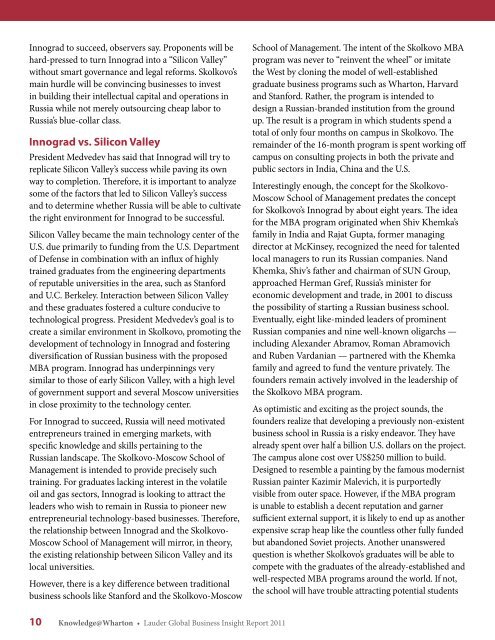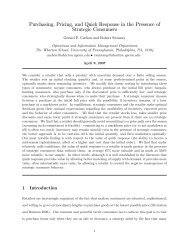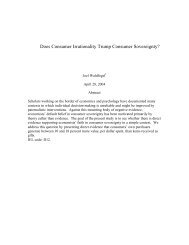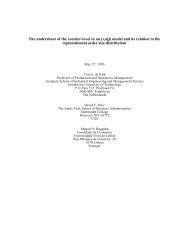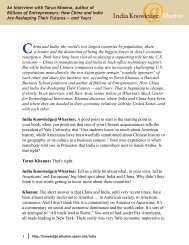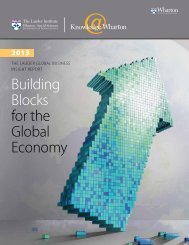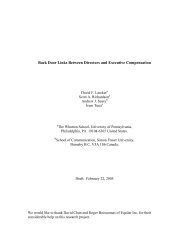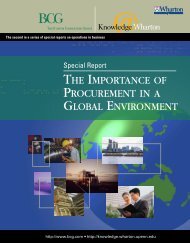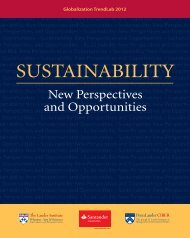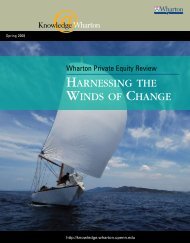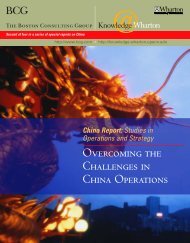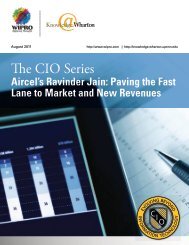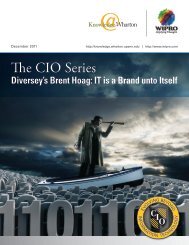The Lauder Global Business Insight Report 2011 - Knowledge ...
The Lauder Global Business Insight Report 2011 - Knowledge ...
The Lauder Global Business Insight Report 2011 - Knowledge ...
You also want an ePaper? Increase the reach of your titles
YUMPU automatically turns print PDFs into web optimized ePapers that Google loves.
Innograd to succeed, observers say. Proponents will be<br />
hard-pressed to turn Innograd into a “Silicon Valley”<br />
without smart governance and legal reforms. Skolkovo’s<br />
main hurdle will be convincing businesses to invest<br />
in building their intellectual capital and operations in<br />
Russia while not merely outsourcing cheap labor to<br />
Russia’s blue-collar class.<br />
Innograd vs. silicon Valley<br />
President Medvedev has said that Innograd will try to<br />
replicate Silicon Valley’s success while paving its own<br />
way to completion. <strong>The</strong>refore, it is important to analyze<br />
some of the factors that led to Silicon Valley’s success<br />
and to determine whether Russia will be able to cultivate<br />
the right environment for Innograd to be successful.<br />
Silicon Valley became the main technology center of the<br />
U.S. due primarily to funding from the U.S. Department<br />
of Defense in combination with an influx of highly<br />
trained graduates from the engineering departments<br />
of reputable universities in the area, such as Stanford<br />
and U.C. Berkeley. Interaction between Silicon Valley<br />
and these graduates fostered a culture conducive to<br />
technological progress. President Medvedev’s goal is to<br />
create a similar environment in Skolkovo, promoting the<br />
development of technology in Innograd and fostering<br />
diversification of Russian business with the proposed<br />
MBA program. Innograd has underpinnings very<br />
similar to those of early Silicon Valley, with a high level<br />
of government support and several Moscow universities<br />
in close proximity to the technology center.<br />
For Innograd to succeed, Russia will need motivated<br />
entrepreneurs trained in emerging markets, with<br />
specific knowledge and skills pertaining to the<br />
Russian landscape. <strong>The</strong> Skolkovo-Moscow School of<br />
Management is intended to provide precisely such<br />
training. For graduates lacking interest in the volatile<br />
oil and gas sectors, Innograd is looking to attract the<br />
leaders who wish to remain in Russia to pioneer new<br />
entrepreneurial technology-based businesses. <strong>The</strong>refore,<br />
the relationship between Innograd and the Skolkovo-<br />
Moscow School of Management will mirror, in theory,<br />
the existing relationship between Silicon Valley and its<br />
local universities.<br />
However, there is a key difference between traditional<br />
business schools like Stanford and the Skolkovo-Moscow<br />
10 <strong>Knowledge</strong>@wharton • <strong>Lauder</strong> <strong>Global</strong> <strong>Business</strong> <strong>Insight</strong> <strong>Report</strong> <strong>2011</strong><br />
School of Management. <strong>The</strong> intent of the Skolkovo MBA<br />
program was never to “reinvent the wheel” or imitate<br />
the West by cloning the model of well-established<br />
graduate business programs such as Wharton, Harvard<br />
and Stanford. Rather, the program is intended to<br />
design a Russian-branded institution from the ground<br />
up. <strong>The</strong> result is a program in which students spend a<br />
total of only four months on campus in Skolkovo. <strong>The</strong><br />
remainder of the 16-month program is spent working off<br />
campus on consulting projects in both the private and<br />
public sectors in India, China and the U.S.<br />
Interestingly enough, the concept for the Skolkovo-<br />
Moscow School of Management predates the concept<br />
for Skolkovo’s Innograd by about eight years. <strong>The</strong> idea<br />
for the MBA program originated when Shiv Khemka’s<br />
family in India and Rajat Gupta, former managing<br />
director at McKinsey, recognized the need for talented<br />
local managers to run its Russian companies. Nand<br />
Khemka, Shiv’s father and chairman of SUN Group,<br />
approached Herman Gref, Russia’s minister for<br />
economic development and trade, in 2001 to discuss<br />
the possibility of starting a Russian business school.<br />
Eventually, eight like-minded leaders of prominent<br />
Russian companies and nine well-known oligarchs —<br />
including Alexander Abramov, Roman Abramovich<br />
and Ruben Vardanian — partnered with the Khemka<br />
family and agreed to fund the venture privately. <strong>The</strong><br />
founders remain actively involved in the leadership of<br />
the Skolkovo MBA program.<br />
As optimistic and exciting as the project sounds, the<br />
founders realize that developing a previously non-existent<br />
business school in Russia is a risky endeavor. <strong>The</strong>y have<br />
already spent over half a billion U.S. dollars on the project.<br />
<strong>The</strong> campus alone cost over US$250 million to build.<br />
Designed to resemble a painting by the famous modernist<br />
Russian painter Kazimir Malevich, it is purportedly<br />
visible from outer space. However, if the MBA program<br />
is unable to establish a decent reputation and garner<br />
sufficient external support, it is likely to end up as another<br />
expensive scrap heap like the countless other fully funded<br />
but abandoned Soviet projects. Another unanswered<br />
question is whether Skolkovo’s graduates will be able to<br />
compete with the graduates of the already-established and<br />
well-respected MBA programs around the world. If not,<br />
the school will have trouble attracting potential students


